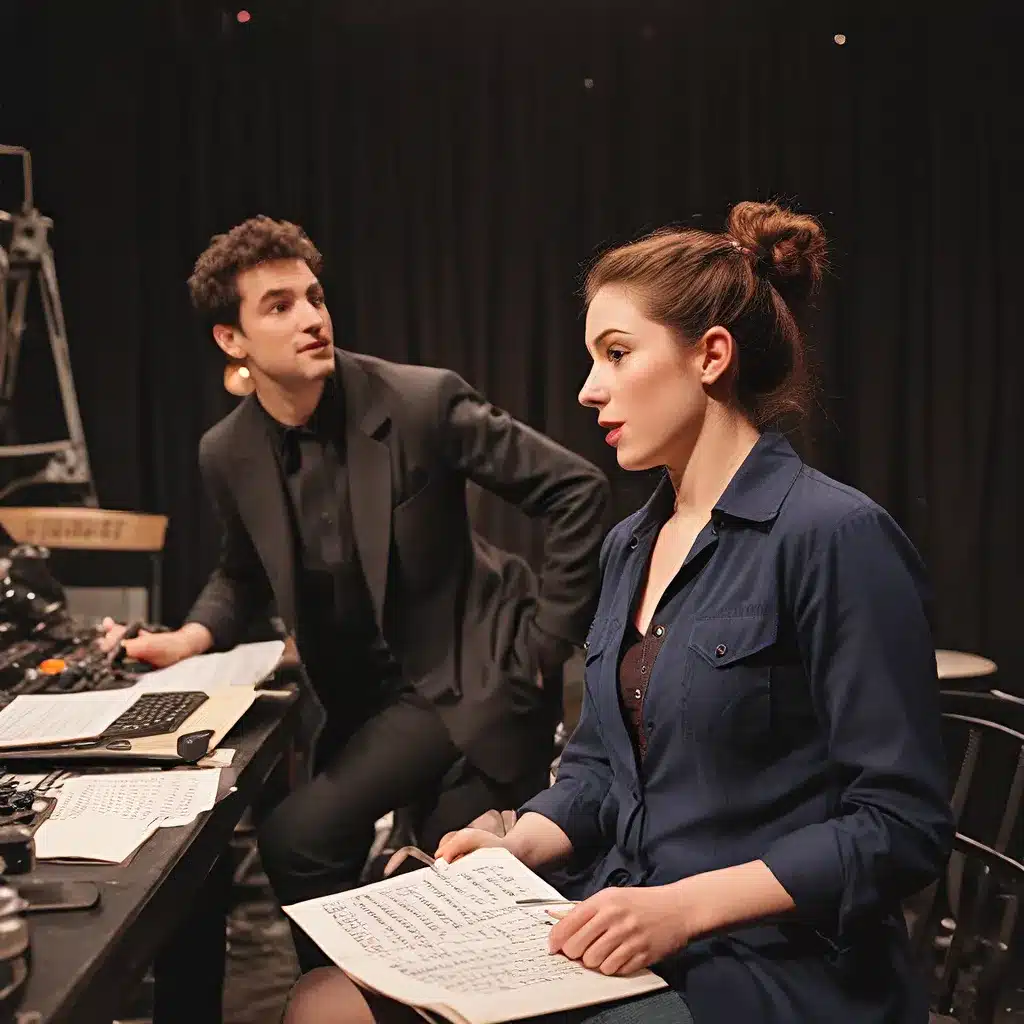
Stage Managers: The Unsung Heroes of Musical Theater
The Backstage Maestros
I’ll never forget the first time I stepped behind the curtain and witnessed the magic of musical theater. It was like pulling back the veil on a hidden world, a bustling hive of activity where the true artistry happened. Amidst the chaos, one figure stood calm and collected, orchestrating the entire production – the stage manager.
As a lifelong lover of the performing arts, I’ve always been fascinated by the people who make the magic happen. While the actors, singers, and dancers captivate audiences from the stage, there’s a whole army of unsung heroes toiling away behind the scenes. And at the heart of it all are the stage managers – the backbone of any successful musical theater production.
In my years of involvement with the Musical Theater Center, I’ve had the privilege of working alongside some truly remarkable stage managers. Their ability to juggle the countless moving parts of a show, all while maintaining a calm and collected demeanor, is nothing short of awe-inspiring.
The Maestro’s Baton
Just as a conductor wields the baton to keep an orchestra in sync, the stage manager is the conductor of the entire production. They are the ones who orchestrate the seamless flow of every element, from the lighting and sound cues to the intricate choreography and scene changes. Their job is to ensure that everything runs like a well-oiled machine, even when the unexpected inevitably happens.
As I learned from veteran stage manager Caroline Moore, “The most important person in the theater without exception is the Stage Manager who is ultimately responsible for every aspect of a performance.” They are the ones who oversee the smooth running of rehearsals, manage the stagehands, and maintain the proper timing of the show. And during the performance, they are the ones who call the shots, giving the cues for lighting, sound, and set changes.
It’s a role that requires an incredible amount of multitasking, problem-solving, and quick thinking. As one of my colleagues, Susan Hult, the longtime prompter at the Lyric Opera of Chicago, put it, “A good stage manager is like gold and makes the difference between a smoothly running machine and horrors the unthinkable opposite.”
The Unseen Maestros
While the stage managers may be the conductors of the show, they are by no means the only unsung heroes working behind the scenes. In fact, the musical theater world is full of these unsung maestros, each playing a vital role in bringing the production to life.
Take, for example, the assistant stage managers. As Philip David Morehead, the Head of Music Staff at the Lyric Opera of Chicago, explains, “The ASMs are responsible for the nitty-gritty of running the show – handling such matters as entrances of artists, making sure they have the right props, and dealing with any of the myriad problems that may arise.” They’re the ones who work closely with the stagehands, cueing their movements and ensuring that everything is executed flawlessly.
And then there are the lighting and sound experts, the costume designers and dressers, the stage carpenters and electricians – an entire army of individuals whose contributions often go unnoticed by the audience. But without their tireless efforts, the show simply wouldn’t be possible.
As I’ve witnessed firsthand, the level of coordination and teamwork required to mount a successful musical theater production is truly staggering. It’s a well-choreographed dance, with each member of the crew playing a crucial role in the overall success of the performance.
The Rewards of Being an Unsung Hero
While the stage managers and their crew may not always get the recognition they deserve, the rewards of their work can be deeply fulfilling. As Mark Fredericks, a longtime pit musician and percussionist at the Community Little Theatre, put it, “For the performers and others involved in a theatrical production, theater provides an outlet for their creativity, a chance for them to be someone else for a period of time, and an opportunity to showcase their unique talents and abilities.”
And for the audience, the work of these unsung heroes creates an experience that is truly magical. As Morehead observes, “If all goes well, the audience will be totally unaware of the work of all of these people – they should be invisible and inaudible to the audience. But they are all indispensable in the proper running of that most complex of all the art forms, opera.”
In my own experience, I’ve seen the joy and pride that these backstage maestros take in their work. They may not be the ones in the spotlight, but they know that without their efforts, the show simply wouldn’t go on. And that, to me, is the greatest reward of all.
The Unsung Heroes of Tomorrow
As I look to the future of musical theater, I’m excited to see the next generation of unsung heroes taking the stage. At the Musical Theater Center, we’re committed to nurturing the next wave of stage managers, lighting designers, and sound engineers, giving them the tools and the training they need to excel in their craft.
It’s a responsibility that I take seriously, because I know that the success of any musical theater production rests squarely on the shoulders of these behind-the-scenes heroes. And as I watch them hone their skills, I can’t help but feel a sense of pride and excitement for the future of this art form.
Because while the actors and singers may take center stage, it’s the unsung heroes who truly make the magic happen. And in my book, that’s the greatest role of all.

